
- Homepage
- Author
- Aleister Crowley (10)
- Anonymous (12)
- C H Spurgeon (10)
- Charles Dickens (25)
- Edgar Allan Poe (14)
- God (22)
- John Dee (21)
- L. Frank Baum (10)
- Lewis Carroll (41)
- Louisa May Alcott (10)
- Maria Parloa (9)
- Mark Twain (8)
- Mixed Authors (11)
- Rudyard Kipling (23)
- Selected (8)
- Unknow (8)
- Unknown (32)
- Various (39)
- Walter Scott (9)
- William Shakespeare (28)
- ... (5061)
- Era
- Format
- Language
- Narrative Type
- Topic
Narratives Of Remarkable Criminal Trials Rare Antique Old 1846 Lady Duff Gordon
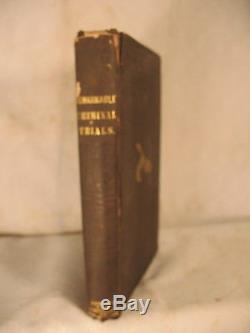




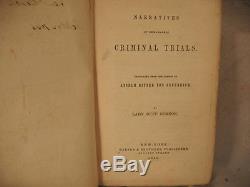
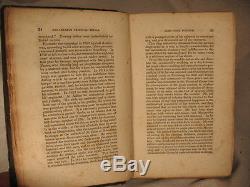
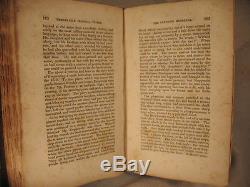
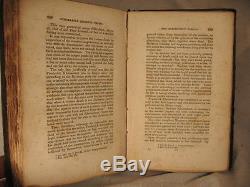


NARRATIVES OF REMARKABLE CRIMINAL TRIALS, translated from the German of Anselm Ritter Von Feuerbach by LADY DUFF GORDON. Published HARPER & BROTHERS 82 Cliff street New York 1846. Original old Booksellers label inside cover - DANIELS & SMITH'S Cheap Book Store, cor fourth & arch sts Philadelphia. 339 pages with various degrees of spotting/yellowing throughout.
Original owners signature on blank page-SARA BEACH JONES OCTOBER 1846. Hardcover has lot of wear, edge wear, worn bumped corners. Some splits along spine, damage on spine. Book measures 7 1/4" by 4 7/8".
This book came from an estate, family names include sarah ralston jones, sarah chester rogers, sarah chester whittingham. Sarah beach jones, anna amelia rogers, hannah whittingham, anna a rogers, samuel beach jones, charlotte boardman rogers. Harrison conrad, mary conrad, anna a r conrad. Thank you for looking at my listings.
Please look at the photographs to help determine the condition, and ask any questions if you need to know anything else. Lucie, Lady Duff-Gordon (18211869) was an English. She is best known for her Letters from Egypt and Letters from the Cape.
She had TB and in 1851 went to South Africa for the'climate' which she hoped would help her health, living near the Cape of Good Hope. For several years before travelling to Egypt in 1862.
Many critcs regard her as being'progressive' and tolerant, although she also held problematic views of various racial groups. Her letters home are celebrated for their humor, her outrage at the ruling Ottomans, and many personal stories gleaned from the people around her.
In many ways they are also typical of orientalist traveller tales of this time. Most of her letters are to her husband, Alexander Duff-Gordon.
She married Duff-Gordon in Kensington in 1840. And their daughter, Janet Ann Ross.(née Duff Gordon), was born in 1842 and died in 1927. Lady Duff-Gordon was also the author of a number of translations, including one of Wilhelm Meinhold. She is one of the characters in the novel The Mistress of Nothing by Kate Pullinger.
Paul Johann Anselm Ritter von Feuerbach (14 November 1775 29 May 1833) was a German. His major work was a reform of the Bavarian.
Penal code which became a model for several other countries. He was born in Hainichen. He received his early education at Frankfurt on Main. Where his family had moved soon after his birth. At the age of sixteen, however, he ran away from home, and, going to Jena, was helped by relations there to study at the university.
In spite of poor health and the most desperate poverty, he made rapid progress. He attended the lectures of Karl Leonhard Reinhold.And soon published some literary essays of more than ordinary merit. In 1795 he took the degree of doctor of philosophy. It was this step which led him to success and fame, by forcing him to turn from his favourite studies of philosophy. And history to that of law.
Which was repugnant to him, but which offered a prospect of more rapid advancement. At 23 he came into prominence by a vigorous criticism of Thomas Hobbes.
Soon afterwards, in lectures on criminal jurisprudence he set forth his famous theory, that in administering justice judges should be strictly limited in their decisions by the penal code. This new doctrine gave rise to a party called Rigorists.
Von Feuerbach was the originator of the famous maxim nullum crimen, nulla poena sine praevia lege poenali. "There's no crime and hence there shall not be punishment if at the time no penal law existed". In 1801 Feuerbach was appointed extraordinary professor. Of law without salary, at the University of Jena.
And in the following year accepted a chair at Kiel. Where he remained two years. His chief work was the framing of a penal code for Bavaria. In 1804, he had moved from the University of Kiel.
To the University of Landshut. But, on being commanded by King Maximilian Joseph. To draft a penal code for Bavaria (Strafgesetzbuch für das Königreich Bayern), in 1805 he moved to Munich where he was given a high appointment in the Ministry of Justice and was ennobled in 1808. The practical reform of penal legislation in Bavaria was begun under his influence in 1806 by the abolition of torture. Out of his practical experience in the Ministry of Justice with evaluating death penalties by Bavarian courts for royal pardon he published the most notable cases 1808/11 in Merkwürdige Criminalfälle and 1828/29 a much enlarged collection Aktenmäßige Darstellung merkwürdiger Verbrechen (Notable crimes presented according to the court records). With this legal handbook of criminal cases in the tradition of the famous "Causes Célèbres" of the Franch lawyer Gayot de Pitaval (16731743) Feuerbach intend to establish a modern criminal psychology ("Seelenkunde") for crime investigation, criminal judges, etc. In the course of time, his work has been misinterpreted merely as a literary collection of fictional sensational crimes and many of his court cases have been edited and published as trivial popular crime stories.However, Gerold Schmidt has newly researched that Feuerbach has recorded true historical events at true localities and persons with their real names etc. And that, therefore, his work is a rich historical source for Bavarian local and social history, mentality, biography etc.
In his Betrachtungen über das Geschworenengericht of 1811, Feuerbach declared against trial by jury, maintaining that the verdict of a jury was not adequate legal proof of a crime. Much controversy was aroused on the subject, and the author's view was subsequently to some extent modified. The result of his labours on the Bavarian penal code was promulgated in 1813.
The influence of this code, the embodiment of Feuerbach's enlightened views, was immense. It was at once made the basis for new codes in Württemberg. It was adopted in its entirety in the grand-duchy of Oldenburg. And it was translated into Swedish by order of the king. Several of the Swiss cantons reformed their codes in conformity with it.Feuerbach had also undertaken to prepare a civil code for Bavaria, to be founded on the Code Napoléon. This was afterwards set aside, and the Codex Maximilianus adopted as a basis. But the project did not become law. During the war of liberation.
(18131814), Feuerbach showed himself an ardent patriot, and published several political brochures. In 1814 Feuerbach was appointed second president of the court of appeal. And three years later he became first president of the court of appeal at Anspach.
In 1821 he was deputed by the government to visit France, Belgium, and the Rhine provinces for the purpose of investigating their juridical institutions. As the fruit of this visit, he published his treatises Betrachtungen über Öffentlichkeit und Mündigkeit der Gerechtigkeitspflege (1821) and Über die Gerichtsverfassung und das gerichtliche Verfahren Frankreichs (1825). In these he pleaded unconditionally for publicity in all legal proceedings. In his later years, he took a deep interest in the fate of the strange foundling Kaspar Hauser.
Who had excited so much attention in Europe. PLEASE TAKE A LOOK AT MY COLLECTION OF OTHER COOL STUFF I HAVE LISTED. Check out my other items. Please look at my other listings. I have hundreds of other items listed in my store BUNCH OF OLD STUFF. Our post office is closed saturday, sunday and other holidays. Be sure to add me to your favorites list. The fast, easy, and secure way to pay online. Add a map to your own listings.The item "NARRATIVES OF REMARKABLE CRIMINAL TRIALS RARE ANTIQUE OLD 1846 LADY DUFF GORDON" is in sale since Thursday, April 26, 2012. This item is in the category "Books\Antiquarian & Collectible". The seller is "scottalbertson" and is located in Nellysford, Virginia.
This item can be shipped worldwide.
- Binding: Hardcover
- Subject: Law & Government
- Printing Year: 18460000

